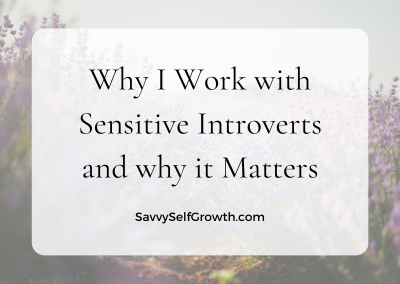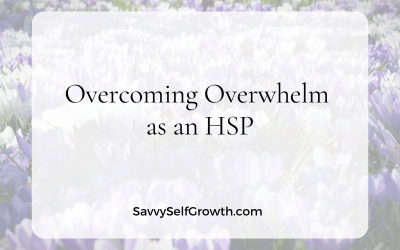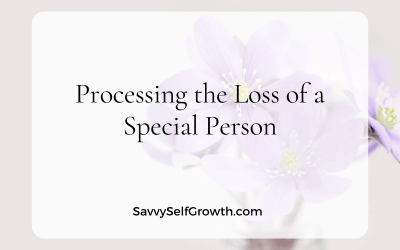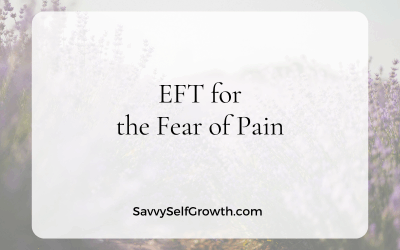“Too often we underestimate the power of a touch, a smile, a kind word, a listening ear, an honest compliment, or the smallest act of caring,
all of which have the potential to turn a life around.”
– Leo Buscaglia
Sensitivity and introversion have been gaining a lot of attention. In this article, I want to share with you why I chose to work with sensitive introverts in my practice, and why it matters to me so deeply.
Let’s start with:
What is a Highly Sensitive Person or HSP?
First, there are a few common misunderstandings about HPS’s we need to clear up.
#1: HSPs are weak, fragile, overly sensitive, or snowflakes.
None of those are true. 20% of the population are highly sensitive people or HSPs, and they experience life with their senses more deeply and intensely than the other 80% of the population. They may need more time to process experiences, and they feel them more deeply. HSPs are deeply touched by beauty and small details that may be overlooked by those who are less sensitive. They have a deeper capacity for empathy, creativity, and intuition, and can be highly resilient and adaptable.
#2: HSPs are shy or introverted.
Some are, yes, and it’s not a universal characteristic. HSPs can be extroverted, introverted and very social too.
#3: HSPs are overly emotional or always overreact.
Most of my clients have sadly heard this for much of their lives. “You’re just too sensitive!” Yes, HSP’s do feel their own emotions deeply, and can also easily tune into and experience the emotions of those around them. HSPs are highly attuned to their environments and can pick up on subtle cues that others may miss. This can lead to a more intense emotional experience, but it’s not the same as being irrational or overreactive.
#4: HSPs are always overwhelmed.
Yes, they can be prone to feeling overwhelmed with all the extra sensory information they need to process. Yet with the right strategies and self-care practices, HSP’s can thrive in many environments.
#5: HSPs are rare.
They’re not rare, unless you want to call those who are non-sensitive rare, too. Around 20% of the population are highly sense-itive. On the opposite end, 20% of the population are not sense-itive at all, while the other 60% fall within the normal sense-itivity range. So no — they are not as rare as you might think. Many people discover very late in their lives that they are an HSP and it usually leads to huge relief that they are not the only one experiencing life in this way.
So what is a Sensitive Introvert then?
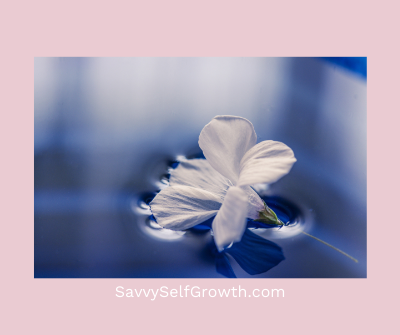
Highly Sensitive People (HSPs) perceive more detail and experience life more deeply and emotionally than most others. Introverts recharge in silence. A combination of the two makes the need for recharging in solitude and silence an absolute must so that they have time to process and integrate sensory input. If they don’t, it can lead to feeling overwhelmed, burn-out, exhaustion, and other health complaints.
My personal experience
I was a very shy and sensitive child, and the concept of introversion or sensitivity was hardly a ‘thing’ then. My dear parents noticed I was less sociable than my sister. They were forever encouraging me to go outside, make friends, and be social.
All I wanted to do was read my precious books, do creative things, and play music by myself or with 1 other person, yet I felt pushed to do what I didn’t want to. I often heard “Be careful, people will think you’re stuck up and unfriendly!”
I grew up with the unconscious message that it wasn’t okay to be me.
As time went by and I started my business in 2006, I had to come right out of my shell and learn how to reach out and talk to strangers. Ooph, how uncomfortable. Yet, I built confidence in this area as I realised there’s an art to it, and actually, I love people and connection.
I started to relate to the idea of being an introvert only around 2013 and finally noticed that most of my clients would identify with being introverted, too.
Then came the day I heard about the concept of an HSP or Highly Sensitive Person. I read well-known books that described the traits. More pieces fell into place for me and led to big relief. I could finally stop feeling bad about some of my traits!
And lastly, I got to know my GallupStrengths. This was another piece of the puzzle that illustrated all the beautiful parts of being a sensitive person in language that anyone can understand.
So why do I care so deeply about sensitive introverts?
Sensitive people who can speak up, can turn a life around.
Have you noticed what a mess our world is in? There’s chaos in almost every area of our societies. With no intention of being judgemental, I firmly believe that it’s the result of the approach of non-sensitive people.
- Where are the empathy and compassion for Mother Earth, nature and her finite resources?
- Where is the attention to detail that can help us make better decisions?
- Where is the care for our fellow human beings, vulnerable people with no voice?
- Where is the fairness in a world where so much of the world’s population has to go without food yet millions of tonnes of food land in our garbage?
I believe with my whole heart that sensitive people can play a large role in solving the problems that plague our modern world.
The trouble is…
Many of them were called snowflakes or overreactive in childhood for the traits that can help them make the world a better place. It has left deep scars in their sensitive souls.
It has led them to hide instead of shining their light. I have worked with so very many sensitive souls who were told to stop being so sensitive, to stop feeling their emotions… they were criticised or judged as a child — so that they are no longer willing to speak out.
And that is why it’s a work of passion for me to help sensitive introverts find their voice and their confidence again: so that they can show up, and contribute more kindness, compassion and empathy in a world that’s forgotten that.
How can Sensitive introverts Contribute to a Better World?
Sensitive people who can speak up, can turn a life around.
With their Empathy:
HSPs can deeply empathise with others, and their compassion and understanding. This makes them excellent listeners and caregivers, and they can excel in fields such as healthcare, social work, and counselling.
With their Attention to Detail:
HSPs are usually detail-oriented and observant, which can be valuable in research, design, and creative arts. They often notice things that others overlook, and this can lead to unique insights and solutions.
With their Creativity:
HSPs tend to have a rich inner world and a deep appreciation for art, music, and other forms of expression. This can make them excellent artists, musicians, writers, and other creative professionals.
With their Intuition:
HSPs are usually highly intuitive and can sense when something is not quite right. And this can be valuable in fields such as law enforcement, security, and other areas where attention to detail and a keen sense of awareness are important.
With their Mindfulness:
HSPs tend to be very aware of their surroundings and their own thoughts and emotions. This can lead to a deep sense of mindfulness and a greater appreciation for the present moment. It can also make them excellent practitioners of mindfulness-based therapies and other techniques for managing stress and anxiety. Like EFT!
Sensitive people who can speak up, can turn a life around.
In a Nutshell:
As they were growing up, many (maybe even most, including me) sensitive introverts were judged and labeled in negative ways about their sensitivity. As a result, they are less likely to use their sensitivity in positive, visionary ways because it was painful to be treated as different or ‘less than others’ in childhood.
It was no one’s fault, either – it’s just the way the world was (and maybe still is) set up. That doesn’t make them victims, either. It just means we have to do some work.
The work I do helps them to let go of that old programming. It supports them to find their voice, speak their truth, and enjoy relationships that work for them, too. Then they can powerfully show up and bring empathy, compassion, and kindness to a world that’s falling apart at the seams.
It’s my firm belief that if we bring back sensitivity, kindness, compassion, and empathy, we can change our struggling world into a place that we’re proud to leave behind…one person at a time.
What do you think? Are you an HSP? Have you been judged or labeled for that? And do you believe you can be a force for good in the world? I’d love to hear from you.

